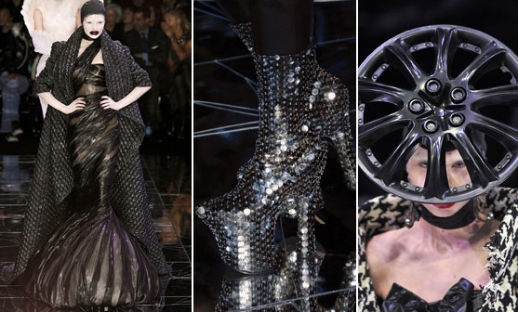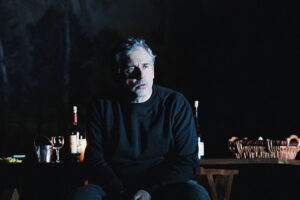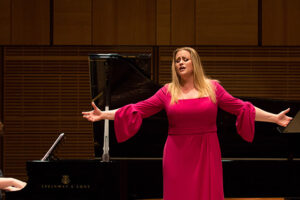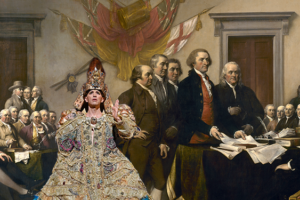

Much is forgiven when one role is sung particularly well. Deborah Voigt‘s Chrysothemis, for a time, was unofficially the above-the-marquee draw, and if you ask me, it was maybe her finest role and an absolutely sufficient reason to go. Me, I don’t remember much at all about how Hannah Schwarz sounded that run through except that I was pretty sure I wouldn’t remember it in fifteen years. Sometimes you know.
Maybe it’s that the orchestra does so much of the work of characterization and the Met’s orchestra is ridiculously fluent in this particular idiom. But it’s more gratifying to think we Straussians who love his brief tragedy best, we the Elektoral college, if you will**, are just that hardcore that we leave the endless kvetching and melodramatic wilting to the bel cantist hothouse flowers.
Yeah I’m just trying to start a turf war there. I like Beatrice di Tenda as much as the next guy at the sports bar.
Elektra has also escaped another sort of pearl-clutching, on account of having existed at the Met since 1992 in an uncontroversially mopey production by Otto Schenk. (The angry slash of red on the curtain is, sorry to say, false advertising.) Not that Elektra, already considered rough going I guess, has been a lightning rod for radical reënvisionings as Southern Gothic or punk rock.
Thursday’s prima (at one point this week I found myself asking someone “is the first night of Hannukah the same as the Elektra prima?”*** which, I know there are supposed to be no original utterances but now I wonder) represents no big splashes, nothing to rock the boat. There’s no new production and in the marquee roles we have a mezzo well-established and well-loved in the house doing a role she’s sung the fuck out of elsewhere (at Tanglewood she pulled off the feat of unstaged dementia), an established if not exactly on-the-sides-of-buses soprano in a role she sang very solidly indeed in the much smaller house in Toronto, and… Voigt.
Some academic whose name I’m not going to google wrote a piece about how Ben Heppner‘s incessant cracking has affected our perception of his roles. (Right, in academia this is not called highly subjective bitching—it’s called a tenure dossier.) Surely much the same could be bloviated about where Ms. Voigt is concerned. The obvious topics of weight and black dresses consigned to Blogatory, there’s no reason to deny that the last five years have been vocally eventful ones that have raised many questions about the next fifteen. As someone wiser than me said, at the mention of one of her off nights, “she’s done too many years of good service to kick her to the curb, but opera companies may not know quite what to do with her.”
What I find confounding and at the same time reassuring is that what roles are going to work out in her voice and what roles aren’t isn’t easily divined. Gioconda, though not fully idiomatic, found her sounding healthy and on top of things, while Tosca has been a struggle, to say the least. The Siegfried Brunnhilde, on the evidence of the 125 gala, is a bit of a minefield; meanwhile, her Chrysothemis is as good as anything she’s ever sung.
Including her Chrysothemis. Yes, the sound is radically different from how she sang it in the 90’s. The plushness that used to go all the way up and all the way down is now largely gone, replaced by something harder and at times more strident, but whereas this stridency wrecked her gala Rosenkavalier trio, it is well-absorbed into Chrysothemis’ music, if anything adding urgency and making the girl a little less of a drag.
Effectively, Voigt now sings more like a dramatic soprano, which lent some air of Opposite Day to her pairing with Susan Bullock. Ms. Bullock, though equal to the role of Elektra, sings it with a certain lyric quality that gives to and takes from the role about what you’d expect: singing against orchestral fury gets lost at times, while a good deal of the recognition scene is sung with more tenderness than many have to lavish on it. There’s a vulnerability inherent to the sound that makes this unlike a Deborah Polaski Elektra (with her hypnotic fury verging on possession) and indeed more like a Hildegard Behrens Elektra, appropriately—fitting, as the production is dedicated to that artist.
And, like Behrens, there is some curdle to the voice that helps cut through the orchestra at times, but for listeners mostly looking for brute force in their Elektra, probably not enough. The scale of Ms. Bullock’s voice allowed, also, for a welcome degree of inflection (“Ich, Mutter? Ich?” rarely enough sounds incredulous or interrogatory, and I don’t think I’ve heard anyone slather as much venom on the words “Tochter meiner Mutter.”) The physical performance was a bit much for some, not least the nod to Elaine Benes in the Beilentanz, but I give the woman credit for aiming too high rather than too low.
Felicity Palmer, now safe to call a house favorite, was also, in her way, slightly, fruitfully miscast. In certain of Klytämnestra’s utterances (“sie redet wie an Aaaaaarzt!”) we expect an element of true grotesque available only to the contralto. Dame Palmer is not a contralto, and though she indulged in some appropriate barking on a few such lines, it was the role’s few mezzo-range money notes that she killed with. This made for a more patrician Klytämnestra than many (including some I adore) who find the Ethel Merman in the role and run with it. I’m never certain of her age, but she’s in fine form and, oh ok this just in from the internet, she’s 65.
As Miss Golightly was saying when she so rudely interrupted herself, the voice is in fine shape and the lady has no compunction about, say, lying on a big chunk of Schenkian detritus on an awkward incline, and so forth. It’s a game portrayal, even if not as forceful and menacing as some.
Fine support came from such as Evgeny Nikitin, a bass with the requisite Orest voice the color of regret, and a good loud set of maids with Wendy Bryn Harmer, compelling in the plummy role of IV (The Phantom Menace.) And the set looked really clean, so you could tell they were totally competent maids. Wolfgang Schmidt as Aegisth made some noises I’m pretty sure weren’t character-driven.
Fabio Luisi found much of the grandeur but little of the drive or brutality in the score, save perhaps for the last moments. And either he has a low strings fetish or I should try an odd numbered Balcony Box next time.
*to the tune of “Mademoiselle from Armentieres.
**but there’s really no reason to.
***no.























Comments